 For far too long Spanish food has been in the shadow of its Mediterranean neighbours. The French consider the third-world to start at the southern side of the Pyrenees and the Italians consider Spain a poor relation in anything related to food. Try telling a Frenchman that a Ribera del Duero is better than a Bordeaux or an Italian that Serrano ham is better than Prosciutto and you’ll see what I mean! :-) One of the main reasons is due to the lack of Spanish emigration in the past, which was where the Italians excelled and consequently insisted on consuming Italian products wherever they settled thus building an international culinary empire difficult to compete with. The Spanish, however, preferred to stay at home, contrary to their ancestors, and the wonders of Spanish cuisine have only recently seen the light in comparison. With millions of tourist landing in Spain each year - 55 million just in the first 10 months of this year - it finally seems to have kicked off in the UK, the tapas revolution is on the way, only what you’re getting isn’t Spanish Tapas but British Spanish-style food, and some things I’ve seen and read are shocking, what more, some brands have no problem labelling their products as food “from the heart of the Spanish home cooking”, are they having a laugh?
For far too long Spanish food has been in the shadow of its Mediterranean neighbours. The French consider the third-world to start at the southern side of the Pyrenees and the Italians consider Spain a poor relation in anything related to food. Try telling a Frenchman that a Ribera del Duero is better than a Bordeaux or an Italian that Serrano ham is better than Prosciutto and you’ll see what I mean! :-) One of the main reasons is due to the lack of Spanish emigration in the past, which was where the Italians excelled and consequently insisted on consuming Italian products wherever they settled thus building an international culinary empire difficult to compete with. The Spanish, however, preferred to stay at home, contrary to their ancestors, and the wonders of Spanish cuisine have only recently seen the light in comparison. With millions of tourist landing in Spain each year - 55 million just in the first 10 months of this year - it finally seems to have kicked off in the UK, the tapas revolution is on the way, only what you’re getting isn’t Spanish Tapas but British Spanish-style food, and some things I’ve seen and read are shocking, what more, some brands have no problem labelling their products as food “from the heart of the Spanish home cooking”, are they having a laugh?
“So-called Spanish food” is invading the UK and being sold under the Spanish flag as traditional Spanish gastronomy when in reality what you are getting are culinary atrocities that have no bearing on traditional Spanish recipes at all. Being a Brit myself and knowing Spanish cuisine I find it quite embarrassing as in the past the British have always accused the Americans of Americanising everything especially the pizza - thin & crispy to deep-pan & greasy. When I see what is being done to Spanish food in the UK I can’t help thinking of that US deep-pan greasy pizza that substituted the Neapolitan stone baked masterpiece.
Recently I read an interesting article that also confirmed my opinion written by a Spanish blogger living in London called Jorge Ruiz from Guirilandia.com. I contacted him, as I really wanted to share some of the photos he had taken while doing the tapas trail of London and he very kindly allowed me to use some of his crime scene evidence and share his findings with you.
Jorge goes on to say: “The brand Spain is present on the majority of the supermarket shelves today. But on many occasions under the title of ‘Spanish food’ authentic atrocities are sold, pigswill which is not even worthy of being called food, let alone Spanish…” And having seen his photos I must say I agree with him. What is it with chorizo? Why on earth do you find it in every Spanish dish outside of Spain? The same thing happens in France, it astonishes me. Who on earth has ever eaten paella with chorizo, in Spain? If you want to, fine, do it, but don’t call it Paella, call it “rice and chorizo” - a Spanglish recipe that will block your arteries. Don’t be fooled into thinking this is the Mediterranean diet of Spain, it isn’t.

Jorge found a small market next to St. James Church close to Piccadilly where an Italian, believe it or not, was stirring what apparently was paella; only it had peas and what looked like pepperoni or chorizo throughout. Either he has no idea what he’s cooking or the Italians are on the revenge after the recent interest in Spanish food and would rather kill it off once and for all than let the authentic Spanish food get a foot in the market :-)
His next stop was London’s historic Greenwich Market where he stopped off at ‘Hola Paella’ to try what they describe on their website as their “signature paella”. To his surprise and to everyone else’s I would imagine they were cooking frozen prawns, chorizo, mussels, peppers and carrots just before adding their secret ingredient: a large bag of frozen Chinese egg fried rice! They clearly get away with it otherwise they would be out of business, but how can you use the word Paella in the name of your business and then give that rubbish to your customers?
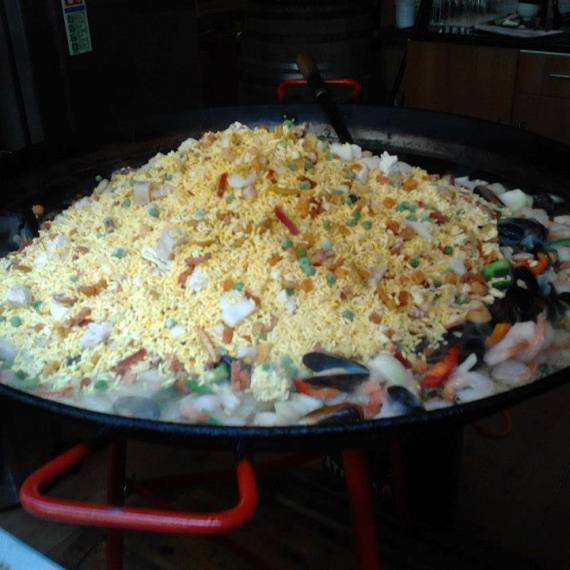
The supermarkets and food brands, as Jorge discovered, have no shame either. What appears to be Chinese egg fried rice…again, is boxed and packaged as Paella by Vesta (mind you, we know what to expect from these types of products) and carries two stamps: one that declares it’s a ‘new’ recipe with a Spanish guitar on it and the other which is intended to be a seal of authenticity which says “Seville, Spain” with a flamenco dancer on it! Come on..Paella doesn’t even come from Seville, it comes from Valencia. Are the general public really that gullible? Or is it that the food companies know that the general public doesn’t have a clue and figures that the only Spanish city that evokes authenticity in the eyes of the consumer is Seville, so that’s the way to catch them out and fool them into buying the product?
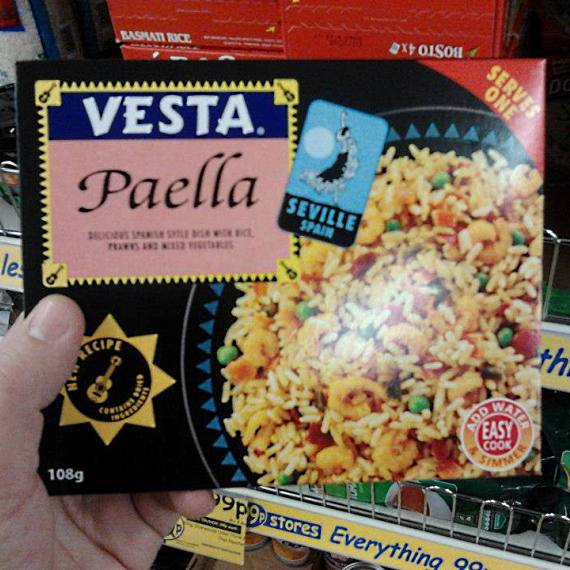
But its not just Vesta the list is endless and even Marks & Spencer play the same tricks as do Lidl and many others. Spanish Omelette is a classic and copied all over the world but to say that a Chorizo and Piquillo pepper tortilla is from the heart of the Spanish home cooking is a bit much …”tender chicken marinated in a classic Mediterranean style with….chorizo…again and Piquillo peppers… again”…that’s so funny! Who writes this and who chooses those recipes when there are so many authentic recipes available that will knock your socks off. Have they not discovered any other ingredients or do they just buy up 3 or 4 ingredients in bulk and remix them over and over again giving them different names and packaging?
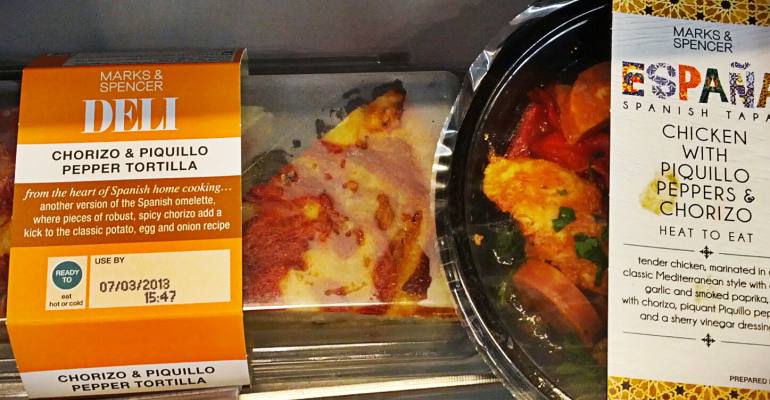
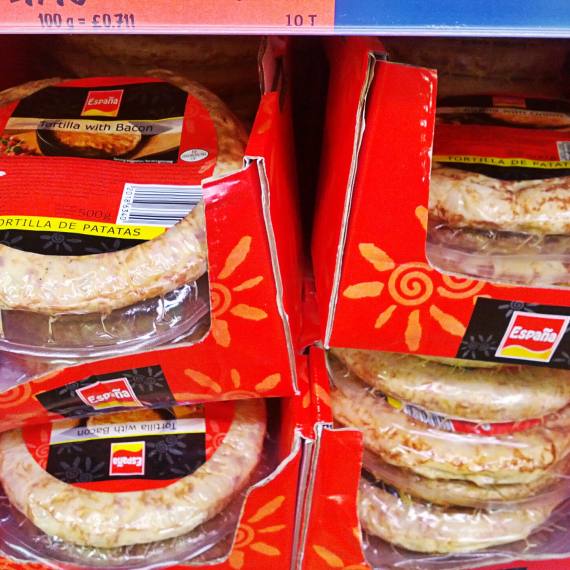
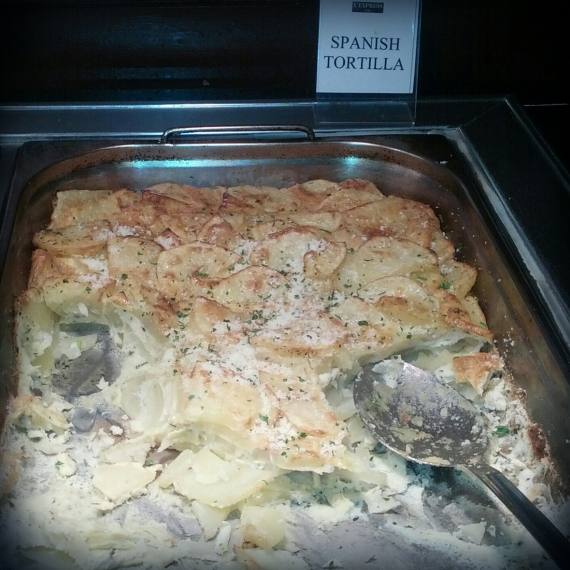
The tortilla which is vacuum packed in Lidl surprisingly comes with bacon and not chorizo, what a relief! But nonetheless just as unauthentic in spite of the convincing ‘España’ logo and text in Spanish. That said they did have a tortilla with…..yes you guessed it, Piquillo peppers! Jorge swears that they were just as plastic on the inside as they were on the outside. But the following Spanish omelette really takes the biscuit. It was served up in a buffet restaurant in the City, those who understand Spanish omelettes will be just as horrified as I was when I saw the photo. Jorge says he still has nightmares about the white powder that was sprinkled over the top…. need I say more. His final stop was Waitrose, which was stocking a soup and we all know how much we Brits love our soups only this flavour I have never tried before…yes you guessed it Chorizo Soup.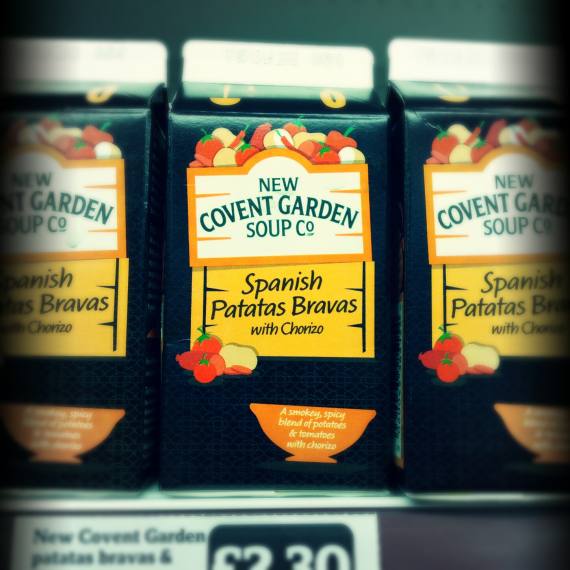 It appears that ‘Spanish’ soups are in fashion as the New Covent Garden Soup Co. offers one too…guess what the flavour? “Spanish Patatas Bravas” with chorizo! - Of course! … there is nothing more Spanish! But in a soup? That’s a first. I’m starting to get the sensation that more chorizo is consumed in the UK than in Spain, in whatever shape or form.
It appears that ‘Spanish’ soups are in fashion as the New Covent Garden Soup Co. offers one too…guess what the flavour? “Spanish Patatas Bravas” with chorizo! - Of course! … there is nothing more Spanish! But in a soup? That’s a first. I’m starting to get the sensation that more chorizo is consumed in the UK than in Spain, in whatever shape or form.
Jorge also shares another photo, which was sent to him by another Spaniard in London, Álvaro, who had decided to attend his craving for Spanish food by visiting ‘Café España’ in Soho only to be greatly disappointed by being served some ridiculous meatballs in a tinned tomato sauce, not exactly a traditional recipe and certainly not worthy of the brand “Spain”.
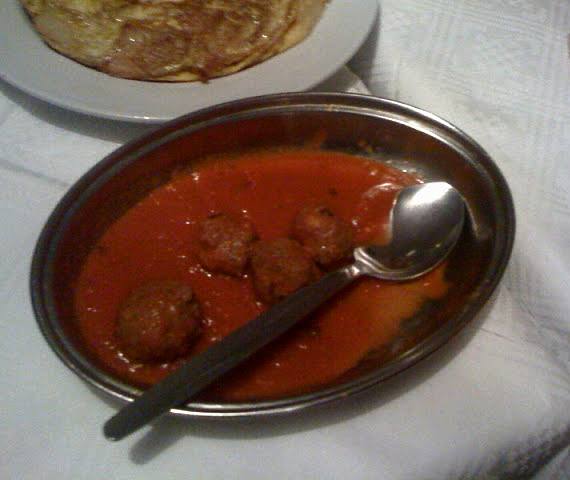
You may say I’m being a bit harsh and I am sure that there are some places that serve decent Spanish food or at least try to follow traditional recipes but it seems that the Spanish culinary education that the general British public are receiving is way off track and has no resemblance to real Spanish food. I just hope that there are real Spanish restaurants out there that can proudly raise the Spanish flag and say this is the real McCoy without having to hide behind Spanglish inventions that quite honestly make me cringe. It’s not difficult to do it properly; in fact I think it’s harder to do what they’re doing. Quality Spanish cuisine has had a tremendous success and led the way internationally over the recent years. Spain now has 171 Michelin-starred restaurants, of which 22 were awarded their first star this year, showing a growing trend. The vast selection of recipes available is enough to keep any chef busy for a lifetime so I sincerely hope that restaurants carrying a Spanish name do the brand ‘Spain’ the justice it deserves. I understand that supermarket chains have to mass produce and move with the trends but that is still no excuse for not producing authentic dishes, there is no need to modify any Spanish dish for the British palate, we enjoy the food when in Spain, so why not give it to us when we are in the UK?
Other popular articles by Ian Mackay ©
WHAT YOU NEED TO KNOW ABOUT OLIVE OIL
Go to article: The World of Olive Oil - Introduction-Part 1
Go to article: The World of Olive Oil- Olive Oil Categories-Part 2
Go to article: The World of Olive Oil - How to recognise an authentic extra virgin olive oil - Part 3
Go to article: The World of Olive Oil - Olive Oil Tasting - Part 4
Go to article: The World of Olive Oil - True Virginity - Part 5
Go to article: The World of Olive Oil - The perfect Crime Scene - Part 6
Go to article: The World of Olive Oil - Harvesting Olives - Part 7
Go to article: Can I fry with Oilve Oil?